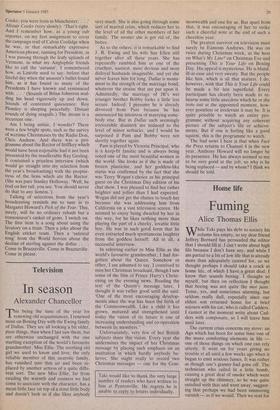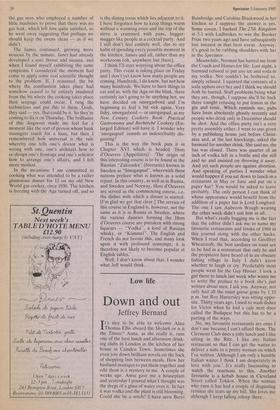Home life
Fuming
Alice Thomas Ellis
While Taki pays his debt to society his column lies empty, so my dear friend Jeffrey Bernard has persuaded the editor that I should fill it. I can't write about high life because I don't have any, and while I am partial to a bit of low life that is already more than adequately catered for, so we thought perhaps I should take a crack at home life, of which I have a great deal. I know that sounds boring. I thought so myself, but then on reflection I thought that boring was not quite the mot juste. Tense, yes, and sometimes alarming, but seldom really dull, especially since our eldest son returned home for a brief sojourn with his cat, who is called Cadders. I cannot at the moment write about Cad- ders with composure, so I will leave him until later.
The current crisis concerns my stove: an Aga which has been for some time one of the more comforting elements in life — one of those things on which one can rely utterly. It went on for years giving no trouble at all until a few weeks ago when it began to emit noxious fumes. It was rather as though one's granny had gone off. The technician who called lit a little bomb, causing a great deal of smoke which went straight up the chimney, so he was quite satisfied with that and went away, suggest- ing that perhaps we had been simmering varnish — as if we would. Then we sent for
the gas man who employed a number of little machines to prove that there was no gas leak, which left him quite satisfied, so he went away suggesting that perhaps we should keep the ovens clean — as if we didn't.
The fumes continued, growing more noxious by the minute. Janet had already developed a sore throat and nausea, and when I found myself exhibiting the same symptoms I considered the moment had come to apply some real scientific thought to the problem. If, I reasoned, the bit where the combustion takes place had somehow ceased to be entirely insulated from the bit where the cooking takes place then seepage could occur. I rang the technicians and put this to them. Gosh, they said — yes, that.could be it. So they're coming to fix it on Thursday. The brilliance of this diagnosis made me feel for a moment like the sort of person whom bank managers touch for a loan, but then I remembered how universal is the rule whereby one tells one's doctor what is wrong with one, one's architect how to re-design one's frontage and one's solicitor how to arrange one's affairs, and I felt more modest.
In the meantime I am committed to cooking what was intended to be a rather glamorous dinner for 12 on my old New World gas cooker, circa 1930. The kitchen. is freezing with the Aga turned off, and so is the dining room which lies adjacent to it.
I have forgotten how to keep things warm without a warming oven and the top of the stove is crammed with pans, hugger- mugger like people at a cocktail party. And I still don't feel entirely well, due to my habit of spending every possible moment in the kitchen, fumes and all, rather than my workroom (oh, anywhere but there).
I think I'll start worrying about the office party. This event is taking place on Friday and I don't yet know how many people are coming. Hundreds, I do know, but not how many hundreds. We have to have things to eat and as, with the Aga on the blink, there certainly isn't going to be anything hot, we have decided on smorgasbord and I'm beginning to feel a bit sick again. Very fishy, smorgasbord — or smogaspud, as my New Century Cookery Book: Practical
Gastronomy and Recherché Cookery (En- larged Edition) will have it. I wonder why `smogaspud' sounds so indescribably dis- gusting?
This is the way the book puts it in Chapter XVI which is headed 'Hors d'Oeuvres (Appetizers)': 'The origin of this interesting course is to be found in the Russian "Zakouska" (foretaste) known in Sweden as "Smogaspud", wherewith these nations preface what is known as a solid repast. In this country, as well as in Russia, and Sweden and Norway, Hors d'Oeuvres are served as the commencing course, i.e. the dishes with which a dinner is started.
[I'm glad we got that clear.] The service of this course in England is, however, not the same as it is in Russia or Sweden, where the various dainties forming the Hors d'Oeuvres course are partaken with strong liqueurs — "Vodka", a kind of Russian whisky, or "Kammer. The English and French do not favour this, and many look upon it with profound contempt; it is therefore not likely to become popular at English tables.'
Well, I don't know about that. I wonder what Jeff would think.







































 Previous page
Previous page